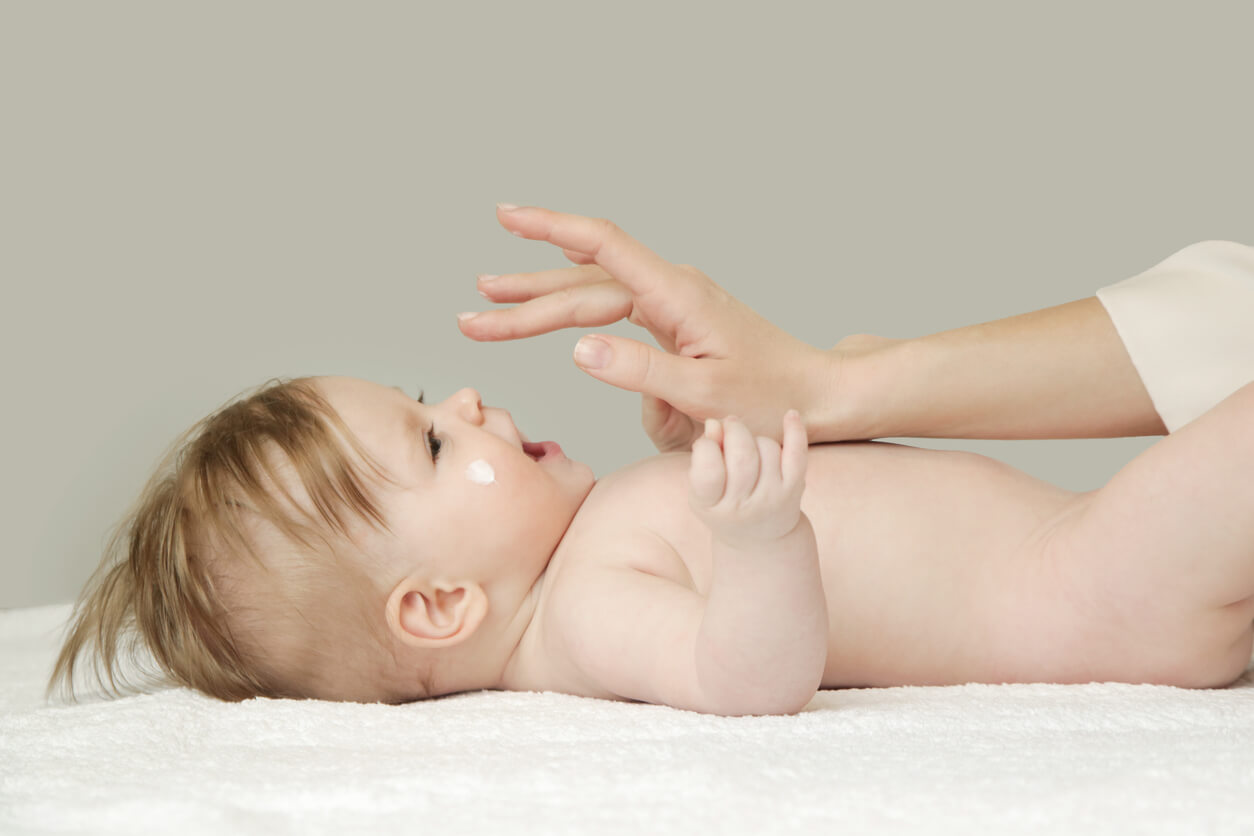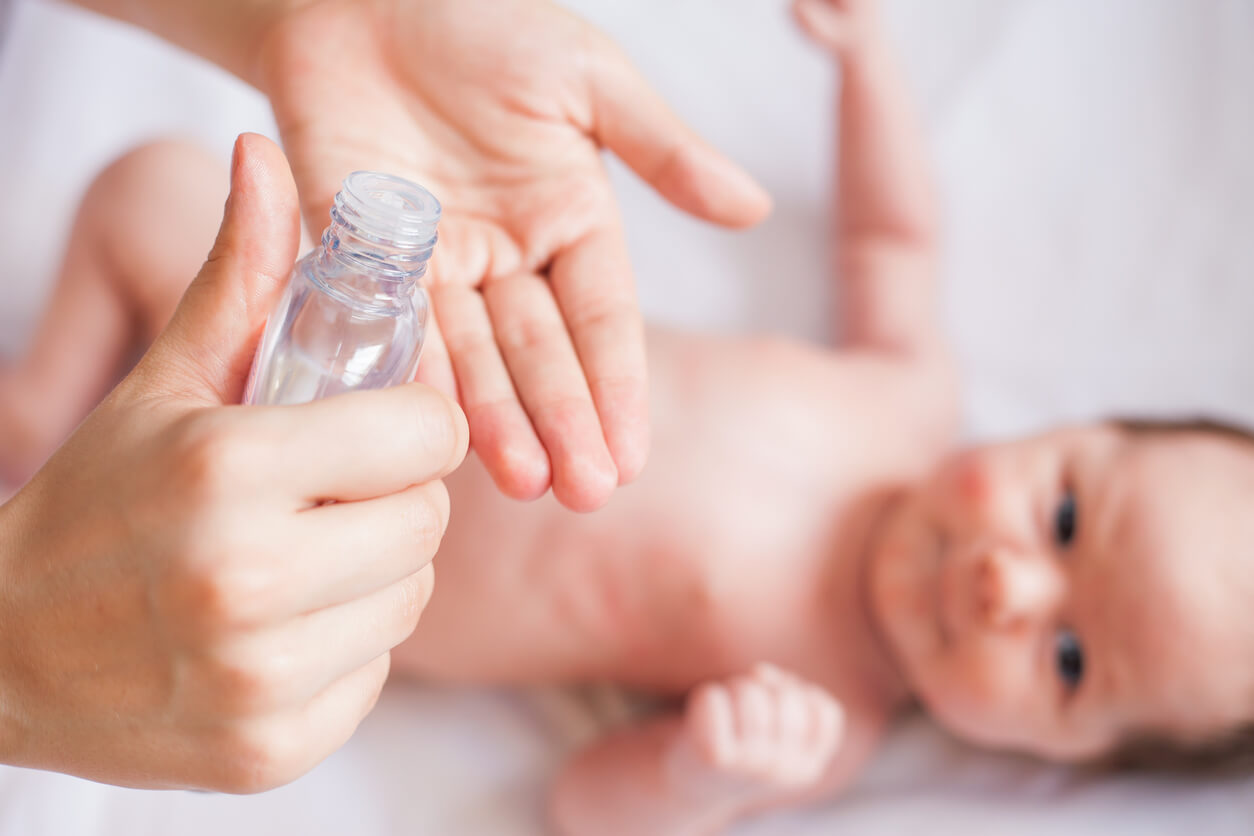9 Tips for Choosing Baby Hygiene and Toiletry Products


Written and verified by the dermatologist Maria del Carmen Hernandez
Choosing baby hygiene and toiletry products is one of the main concerns of new parents. The skin of little ones is more delicate and sensitive than that of adults, therefore, not all the options are suitable for them. Here are some tips for you to choose the most suitable ones.
These are the recommendations for choosing baby hygiene and toiletry products
Babies’ skin isn’t yet fully mature, so some of the functions that the stratum corneum must perform aren’t yet developed. Therefore, when choosing baby hygiene products for your little one, there are some considerations to take into account.
1. Their skin is different from yours
Water alone isn’t enough to clean a baby’s skin. Little ones need at least two baths a week. These should be with lukewarm water. Keep in mind that, compared to adults, their skin is more vulnerable to dryness because their surface cells are smaller, they have less standard microflora, and have less fat in the skin.
Therefore, babies’ skin is more susceptible to changes in the environment (humidity and temperature), as well as seasonal changes.
You may be interested in: How to Avoid Skin Irritation in Babies?
2. Ingredients shouldn’t contain chemicals
Due to the importance of the skin barrier, it’s essential to use baby hygiene and grooming products that have undergone adequate skin tolerance studies. It’s always best to read the components carefully before buying the product.

3. Products need to be natural
While there are products labeled 100% natural, many of them aren‘t free of harmful additives or preservatives. Therefore, try to investigate the unknown components on the label of the products before buying them and thus corroborate that the content is safe.
4. Pay attention to the composition of the products
Always read the composition of the products before buying them. They shouldn’t contain strong substances that may cause discomfort or allergic reactions.
Ideally, they shouldn’t contain parabens, as babies’ skin has the ability to absorb them more easily, which makes them more prone to possible harmful effects.
Phthalates are also components with dangerous properties that are associated with various diseases or conditions, according to studies published by Indoor Air.
5. If a product works well, you don’t have to change it for another
The cost and availability of baby hygiene and grooming products may preclude their appropriate and consistent use in some settings. However, if parents are confident that use doesn’t harm normal skin maturation processes and doesn’t cause adverse reactions, their use should be continued.
Try to buy baby hygiene and grooming products that are recognized for their safety and quality standards.
6. Choose hypoallergenic products
Hypoallergenic products are formulated to present the lowest possible risk of allergic reactions. There are even baby skin care products approved by dermatologists and pediatricians. They’re specially formulated to be gentle on the delicate and sensitive skin of babies.
Read also: Keys to Keeping Your Baby’s Skin Moisturized

7. Preservative and fragrance-free is best
Some baby hygiene and grooming products can affect skin barrier function by stripping lipid components from the skin and thus increasing permeability.
In contrast, moisturizing lotions preserve, protect, and enhance the natural barrier by supplying lipids and preventing water loss.
8. Choose the right pH
The vast majority of syndet cleansers have a neutral or acidic pH and are formulated to be gentler than soap. Therefore, using these types of lotions helps to keep a baby’s skin balanced and healthy.
In addition, it helps protect the skin from environmental irritants. That’s to say, products that aren’t neutral can generate dryness and cause rashes, itching, or irritation.
9. Consult your pediatrician
Baby’s skin is delicate and prone to dryness and irritation. Therefore, care products should be chosen that are gentle but effective, as well as those that protect babies’ skin from environmental irritants such as diapers and dust.
It’s always best to consult your pediatrician, who will recommend the right products to care for your baby’s skin. In addition, the specialist knows the ingredients of the products and the characteristics of the skin surface of newborns to be able to recommend the best options.
The importance of hygiene and grooming products for babies
Babies’ skin should be regularly cleansed, massaged, and moisturized. It’s also susceptible to dryness and doesn’t adapt favorably to products used by adults. Therefore, it’s important to choose a variety of products that are specially tailored to meet the needs of the little ones.
Choosing baby hygiene and toiletry products is one of the main concerns of new parents. The skin of little ones is more delicate and sensitive than that of adults, therefore, not all the options are suitable for them. Here are some tips for you to choose the most suitable ones.
These are the recommendations for choosing baby hygiene and toiletry products
Babies’ skin isn’t yet fully mature, so some of the functions that the stratum corneum must perform aren’t yet developed. Therefore, when choosing baby hygiene products for your little one, there are some considerations to take into account.
1. Their skin is different from yours
Water alone isn’t enough to clean a baby’s skin. Little ones need at least two baths a week. These should be with lukewarm water. Keep in mind that, compared to adults, their skin is more vulnerable to dryness because their surface cells are smaller, they have less standard microflora, and have less fat in the skin.
Therefore, babies’ skin is more susceptible to changes in the environment (humidity and temperature), as well as seasonal changes.
You may be interested in: How to Avoid Skin Irritation in Babies?
2. Ingredients shouldn’t contain chemicals
Due to the importance of the skin barrier, it’s essential to use baby hygiene and grooming products that have undergone adequate skin tolerance studies. It’s always best to read the components carefully before buying the product.

3. Products need to be natural
While there are products labeled 100% natural, many of them aren‘t free of harmful additives or preservatives. Therefore, try to investigate the unknown components on the label of the products before buying them and thus corroborate that the content is safe.
4. Pay attention to the composition of the products
Always read the composition of the products before buying them. They shouldn’t contain strong substances that may cause discomfort or allergic reactions.
Ideally, they shouldn’t contain parabens, as babies’ skin has the ability to absorb them more easily, which makes them more prone to possible harmful effects.
Phthalates are also components with dangerous properties that are associated with various diseases or conditions, according to studies published by Indoor Air.
5. If a product works well, you don’t have to change it for another
The cost and availability of baby hygiene and grooming products may preclude their appropriate and consistent use in some settings. However, if parents are confident that use doesn’t harm normal skin maturation processes and doesn’t cause adverse reactions, their use should be continued.
Try to buy baby hygiene and grooming products that are recognized for their safety and quality standards.
6. Choose hypoallergenic products
Hypoallergenic products are formulated to present the lowest possible risk of allergic reactions. There are even baby skin care products approved by dermatologists and pediatricians. They’re specially formulated to be gentle on the delicate and sensitive skin of babies.
Read also: Keys to Keeping Your Baby’s Skin Moisturized

7. Preservative and fragrance-free is best
Some baby hygiene and grooming products can affect skin barrier function by stripping lipid components from the skin and thus increasing permeability.
In contrast, moisturizing lotions preserve, protect, and enhance the natural barrier by supplying lipids and preventing water loss.
8. Choose the right pH
The vast majority of syndet cleansers have a neutral or acidic pH and are formulated to be gentler than soap. Therefore, using these types of lotions helps to keep a baby’s skin balanced and healthy.
In addition, it helps protect the skin from environmental irritants. That’s to say, products that aren’t neutral can generate dryness and cause rashes, itching, or irritation.
9. Consult your pediatrician
Baby’s skin is delicate and prone to dryness and irritation. Therefore, care products should be chosen that are gentle but effective, as well as those that protect babies’ skin from environmental irritants such as diapers and dust.
It’s always best to consult your pediatrician, who will recommend the right products to care for your baby’s skin. In addition, the specialist knows the ingredients of the products and the characteristics of the skin surface of newborns to be able to recommend the best options.
The importance of hygiene and grooming products for babies
Babies’ skin should be regularly cleansed, massaged, and moisturized. It’s also susceptible to dryness and doesn’t adapt favorably to products used by adults. Therefore, it’s important to choose a variety of products that are specially tailored to meet the needs of the little ones.
All cited sources were thoroughly reviewed by our team to ensure their quality, reliability, currency, and validity. The bibliography of this article was considered reliable and of academic or scientific accuracy.
- Gfatter R, Hackl P, Braun F. Effects of soap and detergents on skin surface pH, stratum corneum hydration and fat content in infants. Dermatology. 1997;195(3):258-62. doi: 10.1159/000245955. PMID: 9407174.
- Blume-Peytavi U, Lavender T, Jenerowicz D, Ryumina I, Stalder JF, Torrelo A, Cork MJ. Recommendations from a European Roundtable Meeting on Best Practice Healthy Infant Skin Care. Pediatr Dermatol. 2016 May;33(3):311-21. doi: 10.1111/pde.12819. Epub 2016 Feb 26. PMID: 26919683; PMCID: PMC5069619.
- Braun F, Lachmann D, Zweymüller E. Der Einfluss eines synthetischen Detergens (Syndet) auf das pH der Haut von Säuglingen [Effect of a synthetic detergent (Syndet) on the pH of the skin of infants]. Hautarzt. 1986 Jun;37(6):329-34. German. PMID: 3087911.
- Hsu NY, Lee CC, Wang JY, Li YC, Chang HW, Chen CY, Bornehag CG, Wu PC, Sundell J, Su HJ. Predicted risk of childhood allergy, asthma, and reported symptoms using measured phthalate exposure in dust and urine. Indoor Air. 2012 Jun;22(3):186-99. doi: 10.1111/j.1600-0668.2011.00753.x. Epub 2011 Nov 16. PMID: 21995786.
This text is provided for informational purposes only and does not replace consultation with a professional. If in doubt, consult your specialist.








